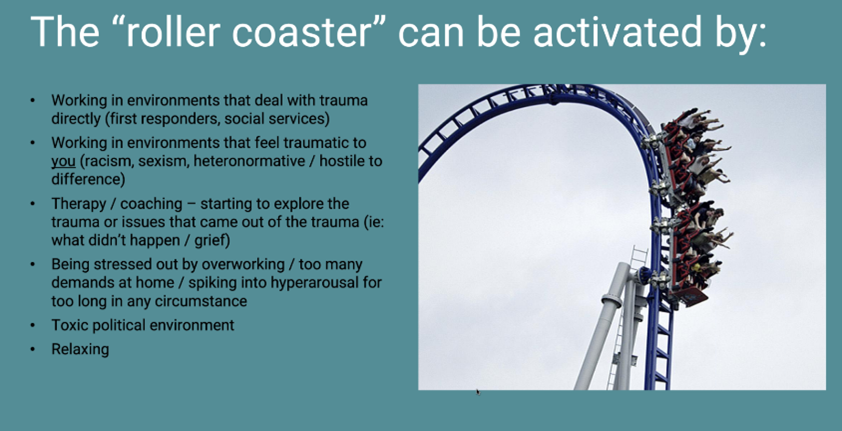Blog: Understanding Trauma
EMPOWERING Updates
Understanding Trauma, Emotional Intelligence and Growth to Strengthen Your Leadership
Knowing yourself is the beginning of all wisdom. – Aristotle
Are you and your people exhausted or burned out? Are you wondering how to manage as things continue to shift and change? Are you experiencing anxiety about what the new normal will look like?
Using compassion, emotional intelligence, and adult development to understand the past year, you can create a plan for recovery and renewal for yourself and your team. Understanding the impact of trauma and development can help support your work leading growth and change, as well as support the important work of diversity, equity, inclusion, and anti-racism.
What is trauma?
Trauma is an experience or event that overwhelms your capacity to defend or protect yourself. It can happen once – like a car crash – or it can be repetitive, like an extended illness or abuse.
Repeated trauma is really three forms of trauma occurring at once.
The first trauma is what happened. The events that actually occurred to a person, such as the act of serving in a war zone.
The second trauma is what that person did to survive the first trauma. This can take on many forms such as emotional numbness, detachment from people, or people-pleasing.
The third trauma is what didn‘t happen. While people are dealing with the first and second trauma, normal development can‘t happen. To illustrate, in a war zone, infrastructure can‘t be built or maintained. When the war ends (which would be the first trauma) the country needs time to catch up with its infrastructure and maintenance. It can take years to build back to where it was before the war, let alone thrive as a country.
The same goes for people that have been through repeated trauma. The growth and development that would regularly occur in a safe situation doesn‘t happen, as all their energy is put into self-protection. Once they are safe, they then have the work of stripping away the self-preservation habits and rebuilding their internal infrastructure.
The trauma roller coaster
Instead of the ability to find an emotional balance, people who are dealing with emotional trauma tend to ride a roller coaster of extreme stress where they fluctuate between hyperarousal (high-adrenaline, hyper-vigilant, anxious, angry, or overstimulated) and hypo arousal (exhausted, numb, apathetic, bored). The roller-coaster ups and downs can be activated by a number of things. Some might surprise you – the simple act of relaxing is often a trigger.

The pandemic has increased instances of emotional trauma. Isolation, entrapment, financial concerns, heightened stress, and relationship issues have been exacerbated. For some, the pandemic has been a trauma. For others who‘ve suffered earlier trauma, the pandemic has heightened the ups and downs of the rollercoaster.
If you have experienced emotional trauma, and this roller coaster sounds like a familiar ride that you‘d like to get off, help is available.
A trauma trail guide
A mountain this size doesn‘t get climbed by one person. It gets climbed by people who pool their talents and spirits.
– Alex Lowe, On the Edge of Antarctica: Queen Maud Land

Gretchen Schmelzer, PhD, is a psychologist and trauma survivor. She has worked for more than 25 years with complex issues of trauma, integration and behaviour change across every level, from individuals to groups to large systems and countries. Her beautifully written and informative book, Journey Through Trauma: A Trail Guide to the 5-Phase Cycle of Healing Repeated Trauma is a powerful resource for anyone who wants to heal from trauma or wants to support people who have experienced trauma.
Her book begins with the assurance, There are so many things that I want you to know. I want you to know that healing from trauma is possible. I want you to understand how being hurt, how living through trauma, how the difficult act of survival has affected you. I want you to know how all the things you did to survive and protect yourself have saved your life and how they may also now be robbing you of the life you could live. How they could be robbing you of the ability to do the work you want to do in the way you want to do it.
But in her book Dr. Schmelzer is very clear: You cannot heal alone. Healing from trauma is like scaling Everest – you need a team to support you.
In a recent The WIT Network webinar, Dr. Schmelzer discusses what trauma is, the impacts it has on how people function, how people can heal from it, and what you can do to support growth in yourself and in others. The webinar also delves into how trauma awareness and building a base camp for stressful times is imperative for business leaders.Watch the full webinar here.